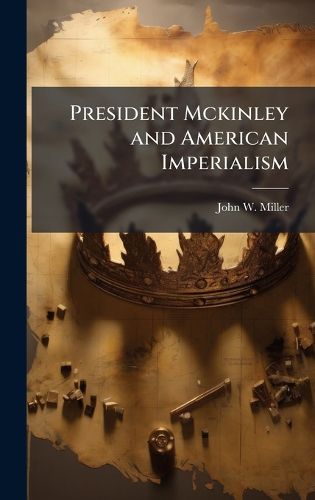Readings Newsletter
Become a Readings Member to make your shopping experience even easier.
Sign in or sign up for free!
You’re not far away from qualifying for FREE standard shipping within Australia
You’ve qualified for FREE standard shipping within Australia
The cart is loading…






William McKinley actively sought territorial expansion during his tenure as President of the United States as a means to stimulate the domestic economy and increase American international prestige. This expansion was critical to the continued economic growth of the United States and its emergence as a world power. This report looks at McKinley's expansionist foreign policy and asserts it was tied directly to attaining economic markets and prosperity for the United States and not, as is commonly believed, a moral duty to help our ?little brown brothers.?1 This foreign policy designed to achieve economic growth conflicted with what many believed were the very foundations of our Constitution, the belief that no man should be ruled by another without consent. America had gained its independence from Great Britain because of the widespread acceptance of this belief and now, a little more than a hundred years later, the country was contemplating colonialism because it was sound business.
This work has been selected by scholars as being culturally important, and is part of the knowledge base of civilization as we know it. This work was reproduced from the original artifact, and remains as true to the original work as possible. Therefore, you will see the original copyright references, library stamps (as most of these works have been housed in our most important libraries around the world), and other notations in the work.
This work is in the public domain in the United States of America, and possibly other nations. Within the United States, you may freely copy and distribute this work, as no entity (individual or corporate) has a copyright on the body of the work.
As a reproduction of a historical artifact, this work may contain missing or blurred pages, poor pictures, errant marks, etc. Scholars believe, and we concur, that this work is important enough to be preserved, reproduced, and made generally available to the public. We appreciate your support of the preservation process, and thank you for being an important part of keeping this knowledge alive and relevant.
$9.00 standard shipping within Australia
FREE standard shipping within Australia for orders over $100.00
Express & International shipping calculated at checkout
Stock availability can be subject to change without notice. We recommend calling the shop or contacting our online team to check availability of low stock items. Please see our Shopping Online page for more details.
William McKinley actively sought territorial expansion during his tenure as President of the United States as a means to stimulate the domestic economy and increase American international prestige. This expansion was critical to the continued economic growth of the United States and its emergence as a world power. This report looks at McKinley's expansionist foreign policy and asserts it was tied directly to attaining economic markets and prosperity for the United States and not, as is commonly believed, a moral duty to help our ?little brown brothers.?1 This foreign policy designed to achieve economic growth conflicted with what many believed were the very foundations of our Constitution, the belief that no man should be ruled by another without consent. America had gained its independence from Great Britain because of the widespread acceptance of this belief and now, a little more than a hundred years later, the country was contemplating colonialism because it was sound business.
This work has been selected by scholars as being culturally important, and is part of the knowledge base of civilization as we know it. This work was reproduced from the original artifact, and remains as true to the original work as possible. Therefore, you will see the original copyright references, library stamps (as most of these works have been housed in our most important libraries around the world), and other notations in the work.
This work is in the public domain in the United States of America, and possibly other nations. Within the United States, you may freely copy and distribute this work, as no entity (individual or corporate) has a copyright on the body of the work.
As a reproduction of a historical artifact, this work may contain missing or blurred pages, poor pictures, errant marks, etc. Scholars believe, and we concur, that this work is important enough to be preserved, reproduced, and made generally available to the public. We appreciate your support of the preservation process, and thank you for being an important part of keeping this knowledge alive and relevant.